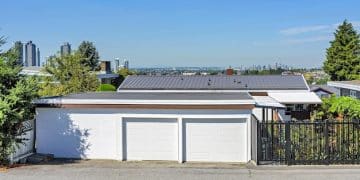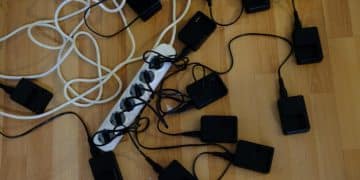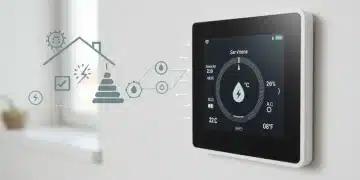Energy-Efficient Water Heaters: The Ultimate Guide to Saving 50%
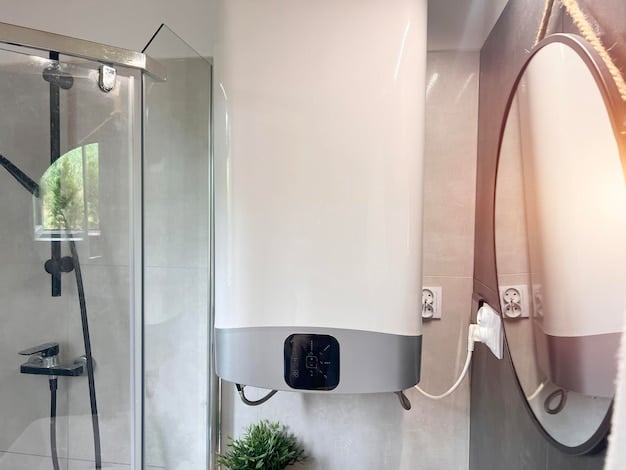
Energy-efficient water heaters can significantly reduce your utility bills and environmental impact; this ultimate guide explores various types, energy-saving strategies, and tips to make informed decisions for your home.
Are you looking to cut down on your energy bills while also making a positive impact on the environment? Look no further! This ultimate guide to energy-efficient water heaters: save up to 50% is your comprehensive resource for understanding, selecting, and maintaining the best water heater for your needs.
Understanding Energy-Efficient Water Heaters
Energy-efficient water heaters are designed to minimize energy waste while providing hot water for your household. This not only lowers your utility bills but also reduces your carbon footprint. Let’s dive into what makes a water heater energy-efficient and why it matters.
What Makes a Water Heater Energy-Efficient?
Several factors contribute to a water heater’s energy efficiency. These include insulation, heat source, and design. Understanding these aspects will help you choose the right model.
Why Should You Care?
Investing in an energy-efficient water heater offers numerous benefits beyond cost savings. It supports sustainability, reduces strain on the power grid, and enhances your home’s overall value.
- Lower utility bills each month.
- Reduced environmental impact and carbon footprint.
- Potential eligibility for rebates and tax credits.
- Increased home value and appeal to eco-conscious buyers.
In summary, understanding the core principles of energy-efficient water heaters is the first step toward making an informed decision. By considering these factors, you can select a water heater that aligns with your needs and values.
Types of Energy-Efficient Water Heaters
There are several types of energy-efficient water heaters available, each with its own pros and cons. Understanding these differences is crucial in selecting the best option for your home. Let’s explore the primary types.

Tankless Water Heaters
Tankless water heaters, also known as on-demand water heaters, heat water only when needed. This eliminates the standby heat loss associated with traditional tank models, making them highly efficient.
Heat Pump Water Heaters
Heat pump water heaters use electricity to move heat from one place to another rather than generating heat directly. They pull heat from the surrounding air (or ground) and transfer it to the water, making them 2-3 times more efficient than standard electric water heaters.
Solar Water Heaters
Solar water heaters use solar panels to collect energy from the sun and heat water. They are a sustainable option that can significantly reduce your reliance on electricity or gas, especially in sunny climates.
- Tankless: Ideal for smaller households or situations where hot water is needed intermittently.
- Heat Pump: Best for areas with moderate climates where the ambient air temperature remains fairly consistent.
- Solar: Suitable for sunny regions with the space and inclination for solar panel installation.
Choosing the right type of energy-efficient water heater depends on your specific needs, climate, and energy consumption patterns. Evaluating these factors will help you make the best choice for your home.
Factors to Consider When Choosing a Water Heater
Selecting the right energy-efficient water heater involves careful consideration of various factors. This ensures that your new water heater meets your household’s needs and provides long-term energy savings. Let’s examine these key factors.
Household Size and Hot Water Demand
The size of your household and your daily hot water consumption are crucial considerations. Larger households need water heaters with higher capacity or on-demand capabilities.
Energy Efficiency Ratings (EF and UEF)
Pay close attention to the Energy Factor (EF) and Uniform Energy Factor (UEF) ratings. These metrics indicate how efficiently a water heater uses energy over a typical year. Higher ratings translate to greater savings.
Fuel Type and Availability
Consider the fuel type available in your area (electricity, natural gas, propane) and its cost. Some water heaters are more efficient with certain fuel types, affecting your overall energy costs.
- Calculate your household’s daily hot water needs.
- Compare EF and UEF ratings of different models.
- Evaluate the cost and availability of various fuel types in your area.
- Consider the long-term cost savings against the upfront investment.
Selecting an energy-efficient water heater that aligns with your lifestyle and energy needs requires thoughtful analysis. Weigh these factors to make an informed decision that maximizes your savings and environmental impact.
Installation and Maintenance Tips
Proper installation and regular maintenance are key to maximizing the efficiency and lifespan of your energy-efficient water heater. This ensures that it continues to operate at peak performance and provides consistent hot water.
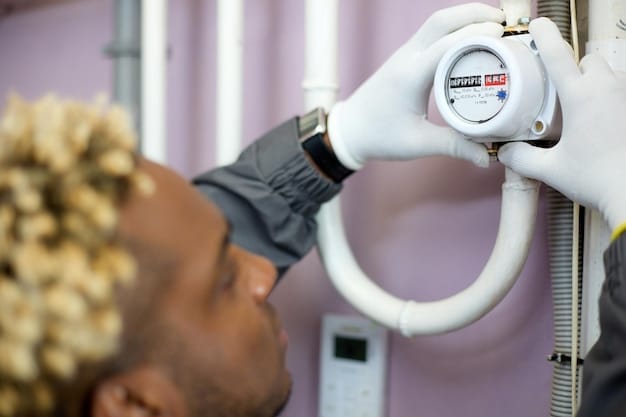
Professional Installation
While some homeowners may consider DIY installation, professional installation is highly recommended. A certified technician ensures that the water heater is installed correctly and complies with local codes.
Regular Maintenance
Regular maintenance, such as flushing the tank or inspecting components, helps to prevent sediment buildup and ensures the water heater operates efficiently. Follow the manufacturer’s recommendations for maintenance schedules.
Insulation
Insulating your water heater (especially tank models) can reduce heat loss and improve efficiency. Use an insulation blanket to wrap the tank and insulate the pipes to minimize heat transfer.
- Hire a certified technician for professional installation.
- Flush the tank annually to remove sediment.
- Inspect anode rods and replace them as needed.
- Insulate the tank and pipes to minimize heat loss.
Following these installation and maintenance tips will help you get the most out of your energy-efficient water heater. Consistent upkeep ensures optimal performance, extends its lifespan, and maximizes your energy savings.
Cost Savings and Rebates
One of the main benefits of switching to an energy-efficient water heater is the potential for significant cost savings. Understanding the long-term financial advantages and available rebates can make your investment even more worthwhile.
Calculating Cost Savings
Estimate your potential cost savings by comparing the energy consumption of your old water heater with that of an energy-efficient model. Use online calculators and energy audits to get an accurate assessment.
Rebates and Incentives
Many utility companies and government agencies offer rebates and incentives for installing energy-efficient appliances, including water heaters. Check with your local utility and state energy office for available programs.
- Estimate your potential cost savings based on energy consumption.
- Research available rebates and incentives in your area.
- Factor in long-term savings and potential resale value.
The financial incentives and long-term savings make investing in an energy-efficient water heater a smart choice. By taking advantage of rebates and understanding the ongoing cost benefits, you can make an environmentally responsible decision that also saves you money.
Future Trends in Water Heating Technology
The future of water heating technology promises even greater energy efficiency and convenience. Keeping an eye on emerging trends can help you make forward-thinking decisions when upgrading your water heater. Let’s explore some exciting developments.
Smart Water Heaters
Smart water heaters use advanced technology to optimize energy consumption based on your usage patterns. They can learn when you typically need hot water and adjust settings accordingly, minimizing standby losses.
Hybrid Systems
Hybrid water heating systems combine different technologies to maximize efficiency. For example, a hybrid system might use a heat pump for regular heating and a gas burner for peak demand, providing the best of both worlds.
Improved Insulation Materials
Ongoing research into insulation materials is leading to more effective and eco-friendly options. These improved materials can reduce heat loss even further, enhancing the efficiency of water heaters.
- Smart water heaters that adapt to your usage patterns.
- Hybrid systems that combine multiple heating technologies.
- Advanced insulation materials for reduced heat loss.
- Integration with home energy management systems.
Staying informed about future trends in water heating technology can help you make wise choices when upgrading your system. Embracing these innovations can lead to even greater energy savings and a more sustainable home.
| Key Point | Brief Description |
|---|---|
| 💡 Types of Heaters | Tankless, heat pump, and solar options. |
| 💰 Cost Savings | Lower utility bills and long-term financial benefits. |
| 🔧 Maintenance | Regular servicing ensures efficiency. |
| 🌱 Environmental Impact | Reduce carbon footprint; support sustainability. |
Frequently Asked Questions
An energy-efficient water heater minimizes energy waste while providing hot water. It typically has better insulation and more efficient heating mechanisms, reducing energy consumption and lowering utility bills.
Savings vary depending on the model and your water usage, but many homeowners see reductions of up to 50% on their water heating costs. Tankless and heat pump models often offer the most significant savings.
The Uniform Energy Factor (UEF) measures a water heater’s overall efficiency based on its annual energy consumption, hot water delivery, and standby losses. Higher UEF ratings indicate greater energy efficiency and cost savings.
Yes, many utility companies and government agencies offer rebates and incentives for installing energy-efficient appliances. Check with your local utility and state energy office for available programs and eligibility requirements.
Energy-efficient water heaters typically last between 10 to 15 years, depending on the type and maintenance. Regular maintenance, such as flushing the tank and replacing anode rods, can extend their lifespan.
Conclusion
Choosing the right energy-efficient water heater can significantly impact your energy bills and environmental footprint. By understanding the different types, considering key factors, and staying informed about future trends, you can make a smart, sustainable choice for your home.
